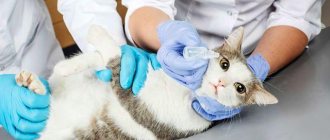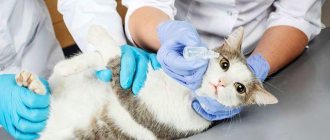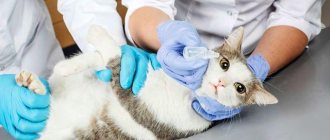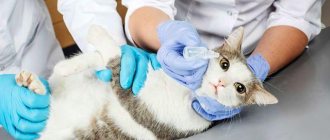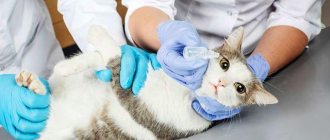Pregnancy is a beautiful and magical process that many women go through. Many pregnant girls begin to wonder how a domestic cat will affect the process of bearing a fetus, whether she feels the condition of the expectant mother, whether allergies will appear, and so on. There are many more myths, some of which can be explained. So what do you need to know about the effect of animals on pregnancy?
Cat and pregnant girl
Cats and pregnancy: myths and reality
People have long known a large number of myths and legends associated with tailed furries, some of them are associated with pregnancy. Whether to believe in them or not - everyone must decide for themselves.
- Pregnant girls should not have close contact with cats, as the child will have many enemies and will generally be unhappy. Scientists have not proven a direct effect on the fate of a child, but contact with cats really needs to be limited. An animal can be a carrier of various infectious diseases that will negatively affect the condition of the fetus. But if the pet is vaccinated, then veterinarians see no reason to limit contact.
- If the animal lies on its stomach, then this is a very bad sign and something may happen to the child. And this myth has not been proven, since cats in this way only show their trust and favor.
- The cat should not climb onto the breast of the expectant mother, as the milk may disappear or spoil. It is better not to let the animal close to the mouth, as there is a high risk of contracting any disease. But this does not affect the availability, much less the quality, of milk.
- If you hit or kick a cat, the baby will be born with increased hairiness or will have many birthmarks. It’s hardly worth commenting on this myth, since not only pregnant women, but also all ordinary people should not offend a cat.
- If the tail tries to sit next to the girl in bed, then something is wrong with the baby. The animal simply gets used to being close to a person. If it used to sleep here, then why should it become something dangerous now?
Diagnosis of toxoplasmosis
Toxoplasmosis can be diagnosed through a blood test because the body produces antibodies when it comes into contact with the parasite. It is best to do this test before you plan to become pregnant. If it fails, then at the very beginning. When reading the results, the doctor checks whether the woman has a history of toxoplasmosis or whether she was recently infected. If the patient has not previously been ill, tests are repeated every three months.
Diagnosis of toxoplasmosis
Do cats feel a special state?
Cats and kittens are able to sense humans well. That is why they can lie down on a sore spot, come up and warm up to a person when he is in a bad mood, and so on.
The animal does not leave the owner
Animals understand perfectly well that a new life is born inside a person; cats, who themselves have already become mothers, feel and understand this especially well. This may sound stupid to some, but animals not only feel, they are able to understand it with their minds.
In addition, they sense smells and temperature better than humans, so the girl is given away by such obvious things as:
- Toxicosis;
- Increased body temperature;
- Frequent urination;
- Nausea, vomiting, diarrhea;
- Changing vaginal changes.
The animal becomes more restless and follows the expectant mother everywhere, as if watching her and protecting her.
Rule 1: do not ignore the advice of the obstetrician-gynecologist who is managing your pregnancy
In the third trimester of gestation, trips to the antenatal clinic become frequent. After 36 weeks of pregnancy, a woman visits an obstetrician-gynecologist every week. What can the doctor advise you during the consultation? First of all, monitor your weight gain, count the amount of fluid you drink and excrete per day.
The amount of fluid you drink is all drinks, soups, and half the volume from fruits and dairy products. The amount of fluid excreted is the volume of urine (diuresis). If these numbers are the same, then everything is great. If the volume of fluid consumed exceeds daily diuresis, this may indicate hidden edema that forms in the intercellular spaces of tissues and organs.
Hidden edema can be a consequence of kidney disease and heart problems. But the most common reason for their appearance is gestosis, which is a complication of pregnancy.
If left untreated, gestosis leads to serious consequences:
- pulmonary edema;
- placental abruption;
- delayed fetal development;
- premature birth.
Preeclampsia is accompanied not only by hidden edema, but also by swelling of the arms and legs, high blood pressure, and proteinuria - the appearance of protein in the urine.
Benefits of a cat
A cat in the house can create a completely different, inviting atmosphere that brings joy and happiness. Fluffies will always support their owner, cheer him up, and it’s nice when someone is always waiting for you at home.
Cat and girl in the same bed
Cats help pregnant women cope with stress and not feel lonely. After all, as soon as you stroke this bundle of happiness, all adversity fades into the background. There are even cases where cats saved their owners, did not allow them to lose consciousness, and brought them to their senses.
There is also an opinion that a cat is a protector from evil spirits. This animal is especially valued in Islam. It drives away all negative energy and protects the owners from adversity.
If you are pregnant, then you should not read horror stories about the terrible impact of fluffies on your health and drive yourself into a stressful state. This is much more dangerous than simply having a healthy cat at home.
Meal schedule
Many people are advised to adhere to a certain diet, eating food at approximately the same time every day. But a more flexible approach to nutrition is also acceptable, depending on the type of diabetes and the medications prescribed to control it
It is important to receive a certain, approximately equal amount of carbohydrate components with each meal. The only thing you can’t do if you have diabetes is fasting for a long time, especially while taking medications or insulin.
This threatens the development of hypoglycemia, even coma.
Correctly determined portion sizes are also important to control blood sugar and your weight. You need to discuss the nuances of nutrition with your doctor, use useful smartphone applications that help create a diet for diabetics.
Why is a cat dangerous for a pregnant woman?
But there are still several aspects that are not myths and are not related to the mystical influence of the animal on the unborn child. There are three main points that can really be dangerous and can affect the health of the mother and her unborn baby. We are talking about possible dangerous diseases, allergic reactions and the aggressiveness of the animal. Let's look at each of them in detail.
Cat on its stomach
Toxoplasmosis in an animal
The most dangerous consequence of contact with animals is the transmission of toxoplasmosis. Toxoplasmosis is a very dangerous infectious disease that develops as a result of the proliferation of special parasites called toxoplasma. Toxoplasma develops in the intestines of many animals, but does not harm them in any way. They usually do not harm the common man. But pregnant girls must be checked for toxoplasmosis before registering.
Approximately 95% of the planet's inhabitants are carriers of this pathogen, and all this is due to contact with animals. Most often, no symptoms are observed: a person simply gets sick, is sick without symptoms, and then the body copes with the infection, and it takes a passive position. Occasionally, muscle pain, a slight increase in temperature, and swollen lymph nodes may occur.
This disease is not transmitted from person to person in any way, even if he is sick and has pronounced symptoms.
Keeping your distance
But for the fetus this disease poses a very serious threat. If infection occurs in the 1st trimester, then there is a high probability of developing various defects in the unborn baby.
Defects such as:
- Brain diseases;
- Pathologies of the eyeballs;
- Defects and congenital diseases of any internal organs;
- Accumulation of fluid between the membranes of the brain.
If the infection occurred in the 2nd trimester, then the following may already develop:
- Damage to internal organs and the development of their failure;
- Improper functioning or complete damage to the nervous system;
- Anemia;
- Thrombocytopenia.
Well, when the fetus is infected in the 3rd trimester, congenital toxoplasmosis begins to develop. In this case, children often experience delayed mental and even physical development; convulsions and seizures may occur regularly. Sometimes, unfortunately, such children are born prematurely or even dead.
Examination by a veterinarian
Most often, girls have already had this disease and then it no longer poses any danger to the baby. But those mothers whose test results are negative immediately try to get rid of all their pets. You don’t have to do this: you just need to take the animal to the veterinarian and get all the necessary vaccinations. In this case, transmission of toxoplasmosis will no longer be possible. After vaccination, the cat can live with relatives for a couple of weeks and later return to its pregnant owner.
Allergy
Even if there was no previous allergy, it may appear during pregnancy. It all depends on individual sensitivity, hereditary factors, immunity and the course of pregnancy.
Symptoms may appear:
- Cough (most often dry);
- Itching with redness;
- Sneezing;
- Nasal congestion or excessive discharge;
- Profuse lacrimation.
If there are no symptoms, then there is no need to isolate the cat, much less kick it out of the house. If the first signs of an allergic reaction appear, you need to isolate the cat (enough in a separate room) and minimize contact. If after a week the reaction has not stopped, then the problem is in the animal’s fur, which means you will have to get rid of the cat. But after the birth of the child, you can take the cat back, since with a high probability the allergy will disappear forever.
To avoid allergies you can do the following:
- Regularly ventilate the rooms in which a pregnant woman is located;
- Clean (wet) every day;
- Buy a humidifier;
- Sleep separately from the cat;
- Minimize the presence of the animal in the kitchen;
- Remove carpets, soft toys and furniture if possible;
- After interacting with a cat, you should wash your hands or it is better to interact with it while wearing gloves.
Cat and child
Aggressive cat behavior
Mothers know firsthand that a cat’s behavior after the birth of a baby can change greatly, unfortunately, sometimes not for the better. This can manifest itself in different ways, but the most important thing is to minimize aggression towards the baby, who cannot yet stand up for himself.
Behavior can change for several reasons:
- Jealousy. This is the most common reason: the cat simply begins to be jealous, because all the main attention goes not to her, but to the new family member;
- Fear of the unknown. In the first year of life, the baby almost always screams, this can frighten the animal and provoke it;
- Interest. The animal becomes very interested in who it was that showed up in the house. Moreover, the baby can emit different smells, which are very interesting to study.
But the situation can always be improved. To do this you need:
- Give your cat enough attention before and after birth. A cat is the same child for whom the attention of the “parent” is very important. Moreover, attention should come not just from some family members, but from everyone, as it was before pregnancy;
- You need to make it clear to your pet that you cannot climb into the crib of a newborn.
- You cannot shout at an animal, much less beat it. This will only provoke conflict;
- Don’t drive the cat away completely, let her carefully get acquainted with the new family member and resident of this house, let her sniff him. Then curiosity will subside.
Peaceful coexistence with your pet during pregnancy
If before pregnancy you used to treat your pet with various sprays against blood-sucking parasites - fleas and ticks - then now you should give them up. It will be best if you purchase an anti-flea collar for your dog.
Hygiene issues are of particular importance during this period.
If earlier you could turn a blind eye to the fact that your dog immediately after a walk rushed into the living room, leaving dirty footprints everywhere - anyway, cleaning is coming soon! - now this can no longer be allowed. Try to wash your dog regularly, comb his fur so that there are no dirty lumps in which bacteria feel so comfortable, and brush his teeth.
Attention: if you have a lap dog that is accustomed to relieve its needs in an apartment in a special toilet, another family member should clean and wash this toilet. If there is no one else to do this but you, put on rubber gloves.
Is it possible to clean a cat's litter box?
It is in the cat's litter box that contains a large number of germs and infections that can be dangerous for a pregnant girl. This includes not only toxoplasmosis, but also worms.
Kitten with baby
If there is another person in the house, then it is better to entrust this difficult task to him. It is better for a pregnant woman to completely minimize contact with all kinds of secretions. If you cannot entrust this task to anyone else, then you need to use gloves and a protective mask.
Mysticism or reason
Cats are creatures that are credited with mystical abilities, and pregnant women, unfortunately, are too impressionable, so they often believe in various stupid superstitions. Many women try to get rid of a pet during pregnancy, but in vain.
No superstitions have anything to do with reality. But there are medical reasons why you need to limit contact with cats or take all preventive measures to protect yourself from serious diseases, and with them from very serious consequences.
Precautionary measures
Everyone should take precautions, not just pregnant women. This includes the following points:
- There is no need to bring the cat close to your face, kiss it, and so on;
- It is best if the fluffy has his own place to sleep;
- It is best to isolate the tray; it should not be removed by pregnant women or small children with an immature immune system;
- Give your cat all necessary vaccinations. Tell the veterinarian that there is a pregnant girl in the house, he will tell you what vaccinations need to be given;
- You need to clean your home every day; you can buy a humidifier or air purifier;
- If possible, it is better to delimit the territory for the girl and the cat.
Animal observation
You should not be afraid of a cat like fire. Since ancient times, the cat has been the main inhabitant of almost every home, protecting its owners and protecting them from evil spirits. Follow all safety precautions, get up-to-date vaccinations and purchase an air humidifier, and then having a cat in the house will not be dangerous for a pregnant woman.
Rule 2: sleep at least 10 hours a day
In the third trimester of gestation, proper rest is very important. Sufficient sleep is the key to your good health, excellent mood, and normal fetal development.
The duration of sleep should be such that after waking up you feel rested and alert. And if for non-pregnant women it is enough to sleep 7-8 hours, then expectant mothers need to rest more - at least 10 hours a day.
It is especially important to get good sleep before giving birth. Imagine a situation where you didn’t sleep at night, and in the morning contractions started, and you went to the maternity hospital. Will your insomnia affect the birth process? It will definitely have an impact.
Insomnia during pregnancy is a reason to consult a psychologist . Perhaps your insomnia is due to fear of the upcoming birth or fear for the health of the unborn baby? A specialist will help you figure out what is happening to you.
Unpleasant consequences
If you get an animal, you also take on responsibilities for it. Therefore, it is completely unacceptable for you to physically punish your pet and cause him pain.
Although he still needs to be educated. This applies to both domestic and wild animals. For example, a dog, which is considered man's best friend, is unlikely to be happy about a change in its owner's mood, even if she is pregnant. And the cat can harbor resentment and anger, which will result in damaged household items, as well as in the furry animal’s failure to comply with toilet rules.
Some signs
There are also folk signs that warn us. Here's why pregnant women shouldn't hit animals:
- this threatens the expectant mother with problems with her legs and other health problems;
- there are likely to be problems with bearing a child and childbirth;
- Some mothers tell stories that after the birth of the child, he developed illnesses or had spots on his body.
How to influence your pet correctly
The expectant mother herself must decide whether to believe such signs or not. However, in any case, you should not beat animals. If you have problems with behavior, for example, cats, then it is advisable to resort to more gentle methods of influencing the animal:
- Experts advise limiting yourself to indirect intimidation. It is enough to cover the window sill or kitchen table with light tin cans, and the animal will become calmer. This way it won't be able to reset anything. Remember that loud noises that are not coming from a person can greatly frighten a cat.
- Often, owners do not want to allow their cat into certain areas of the house. To keep her away from them, you can put upside down mousetraps and cover them with paper. The clap of the device will scare the animal thoroughly.
- If you know why pregnant women should not hit animals, but the cat is not behaving very well, then a spray bottle will help calm it down. A couple of sprays of water and your pet will no longer climb onto the table.
- By treating wires with vinegar, you will keep both the electrical wire and the Internet cable intact.
If you are pregnant, you should be careful about your health. It’s up to you to believe in omens or not, but you shouldn’t offend animals in any case.
There are many reasons why pregnant women should not hit animals. A number of them rely on common sense, describing that such behavior on the part of the expectant mother is fraught with unnecessary nervous experiences. In addition, sudden movements, often required during striking, can provoke undesirable physical consequences. Based on esoteric considerations, harming animals will turn out badly for the unborn child. Superstitions promise that the baby will be born nervous and will have trouble sleeping. Medicine and esotericists recommend reducing contact with animals to avoid physical, moral and spiritual consequences.
Pregnant women should be friends with pets, and not offend them


